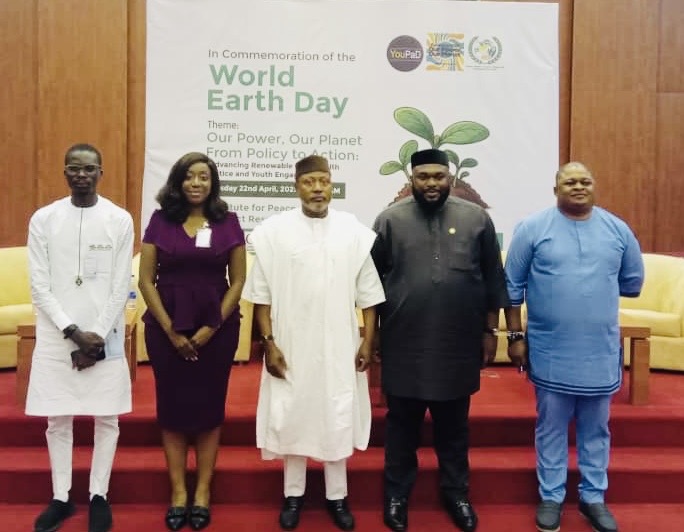Stakeholders urge joint investment in Nigeria’s energy transition
By Akpan Glory
Stakeholders in the environmental sector have called on governments at all levels, civil society groups, and individuals to collaborate and invest in Nigeria’s renewable energy transition process.
Speaking at a conference held in Abuja on Tuesday to commemorate the 2025 World Earth Day, they emphasised the need for substantial financial and technical investments from government and the public.
The event was themed “Our Power, Our Planet: From Policy to Action” and was organised by Young Professionals in Policy and Development (YouPaD) in partnership with Climate Justice, Creative Culture and Communities for Peace (CCC for Peace).
It was also in collaboration with Friedrich Ebert Stiftung, TrashMongers, Ecocykle, Basic Rights Watch, the Initiative for Human Rights and Gender Awareness, the Coalition for Socioecological Transformation (CoSET), and the Institute for Peace and Conflict Resolution.
Mohammed Abdullahi, former Minister of Environment stated that many Nigerians are more concerned with daily survival than with reducing their carbon footprint.
He asserted that to achieve Nigeria’s ambitious climate goals, the government must prioritise breaking the cycle of poverty through targeted programmes.
This, he said would empower citizens to afford climate-friendly solutions such as fuel-efficient cookstoves, LPG and biogas systems, solar home installations, and electric or compressed natural gas (CNG) vehicles.
“The government should place greater emphasis on innovation in energy infrastructure, optimal utilisation of domestic financing, and harmonisation of existing energy policy frameworks.
“In industrialised countries, energy systems have powered decades of development but also caused environmental damage, warming oceans, melting glaciers, and extreme climate events that disproportionately affect poorer nations.
“To truly transition, we must move from a mindset of short-term consumption to long-term restoration. The shift to renewable and sustainable energy is not a luxury, it is a necessity.
“And within that necessity lies an extraordinary opportunity to lead the way toward a better future”.
Abdullahi stressed that a just energy transition must ensure inclusivity, particularly for vulnerable communities, indigenous populations, and marginalised groups.
“This includes creating new opportunities for workers displaced by the fossil fuel phase-out and ensuring their access to retraining and dignified work within the emerging green economy.
“The world today faces an existential crisis driven by unsustainable energy practices, climate change, and environmental degradation. Yet, this is also a moment of unprecedented opportunity,” he added.
Peniel Ibe, Coordinator of CCC for Peace, explained that the initiative seeks to empower Nigerian youth to participate meaningfully in both local and global climate discourse and advocacy.
She noted that the initiative aimed to introduce young people to justice-centred climate solutions and to demonstrate how such solutions could be applied within their local contexts.
“YouPaD serves as a platform for youth engagement in policy, climate change, security, governance, and development”.
 Ibe expressed appreciation to the participants, noting that their presence demonstrated a collective commitment to securing not only the future of the planet and Nigeria, but also a future grounded in justice, inclusion, and action.
Ibe expressed appreciation to the participants, noting that their presence demonstrated a collective commitment to securing not only the future of the planet and Nigeria, but also a future grounded in justice, inclusion, and action.
“As we mark World Earth Day, we are reminded of both the planet’s fragility and the power of our collective resolve as Nigerians.
“The climate crisis challenges us to rethink our approach. We cannot afford to serve both the fossil fuel industry and the renewable energy cause.
“We cannot promote justice and injustice simultaneously, as the consequences, especially for Nigeria would be dire”.
She observed that although momentum is growing across Nigeria and Africa for renewable energy adoption, the transition risks replicating existing inequalities in the fossil fuel extractive industry, if not deliberately planned and inclusive.
She explained that the conference was part of an ongoing initiative by CCC for Peace and YouPaD to bridge the gap between policy dialogue and the lived experiences of communities most affected by climate change, with a focus on youth engagement.
“Policies are often crafted without input from the very communities they affect most. We felt the need to create a space for diverse voices to reflect and respond to a critical question: how do we move beyond policy to meaningful, inclusive action rooted in community realities?
“The fight for a liveable planet, one in which Nigerians are safe, is not only scientific and technical, it is also profoundly social, political, and moral,” she added.
Ibe expressed hope that the outcomes of the conference would translate into tangible actions within tools, strategic frameworks, and collaborative networks.
Other speakers, including David Arinze (Off-Grid Energy), Tengi Ikoli (Natural Resources Governance), and Salaudeen Hashim, of the CLEEN Foundation shared the views of both Abdullahi and Ibe.
They highlighted the importance of policy in promoting renewable energy use in Nigeria.
The conference also featured a panel discussion and fireside chat focused on how young professionals can contribute to Nigeria’s renewable energy transition.
Additional sessions explored strategies for ensuring the transition is rooted in environmental justice.
The event concluded with a screening of Drifting Away, a documentary series by Simpa Sampson, followed by an open discussion session.
The News Agency of Nigeria (NAN) reports that, as a fossil fuel-dependent nation, Nigeria is undertaking a transition aimed at diversifying its energy sources and reducing carbon emissions.
This aligns with the country’s commitment to achieving Net-Zero Emissions by 2060, as outlined in its Nationally Determined Contributions (NDCs) and long-term Low Emissions Development Strategies (LT-LEDS).
The Nigeria Energy Transition Plan (ETP) is a locally developed, data-driven, multi-faceted strategy designed to guide the nation towards net-zero emissions through reforms in energy consumption.
It outlines a roadmap for reducing emissions across five key sectors: Power, Cooking, Oil and Gas, Transport, and Industry sectors responsible for approximately 65 per cent of the country’s greenhouse gas emissions.
Key targets under the ETP include achieving an installed electricity generation capacity of 250GW by 2050, with 90 per cent of this derived from renewable sources.
By the same year, 80 per cent of vehicles are expected to run on electricity, and clean cooking technologies should be adopted by 80 per cent of the population. (NAN)
Edited by Tosin Kolade






 He called for stronger collaboration between trade unions, the private sector, and the government to develop policies that protect jobs and equip workers for employment in the renewable energy sector.
He called for stronger collaboration between trade unions, the private sector, and the government to develop policies that protect jobs and equip workers for employment in the renewable energy sector. While acknowledging the
While acknowledging the 
